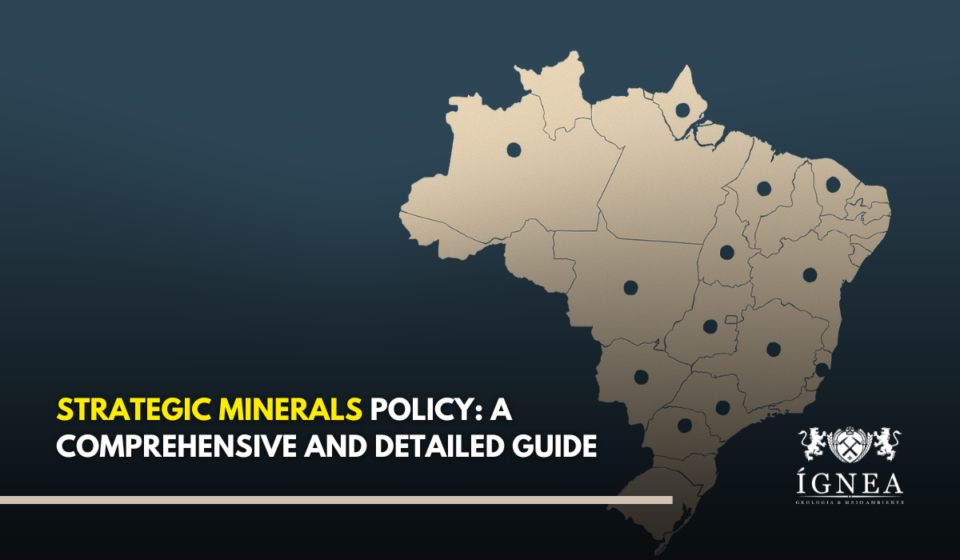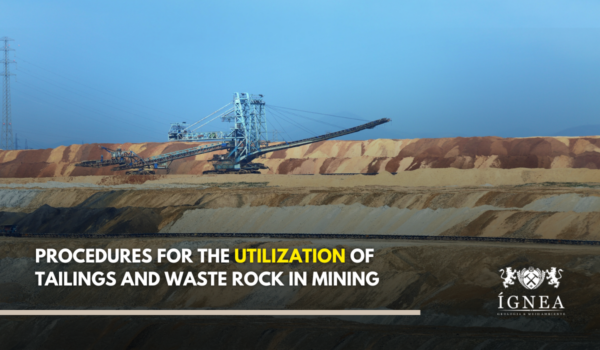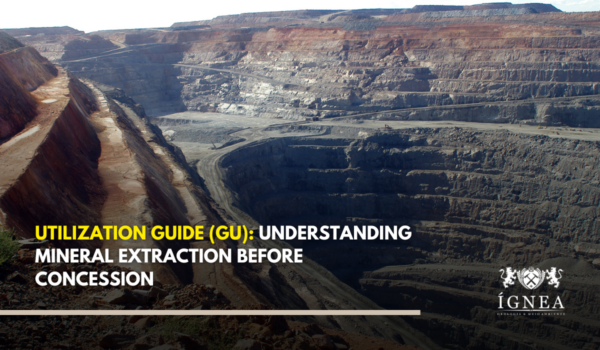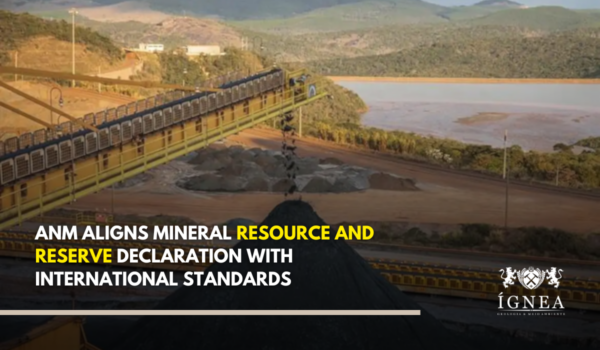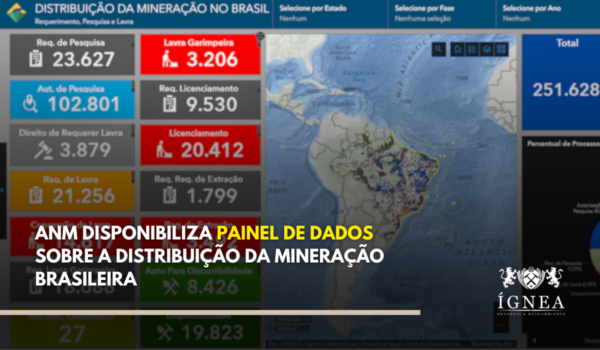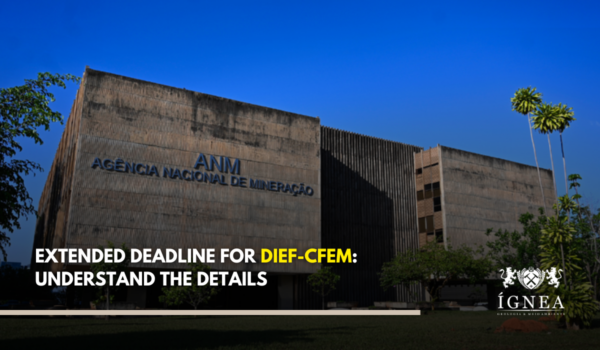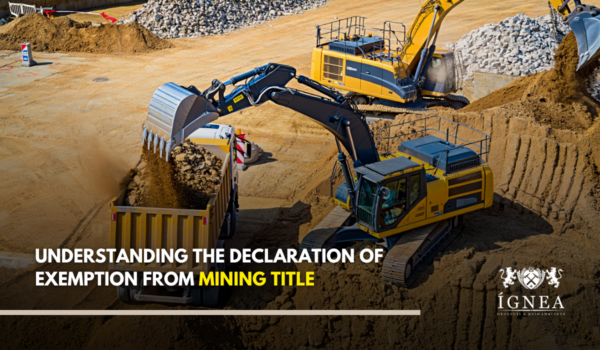Photo: IA/Edition Ígnea
The Brazilian strategic minerals policy, outlined by Decree No. 10,657/2021, Resolution MME No. 1/2021, and Resolution MME No. 2/2021, represents a significant milestone for the mining sector in Brazil. This initiative, designed to boost the production of essential minerals, aims not only to strengthen the national economy but also to guarantee the supply of strategic inputs and promote technological development.
Decree No. 10,657/2021: The Foundation of the Policy
Decree No. 10,657/2021 is the fundamental pillar of this policy, establishing the Policy to Support Environmental Licensing of Investment Projects for the Production of Strategic Minerals, the “Pró-Minerais Estratégicos.” This decree, of a permanent nature, establishes a legal framework for coordinating actions among government agencies, with the central objective of prioritizing projects for the production of strategic minerals.
Key Points of the Decree:
- Objective: To coordinate government efforts to implement projects for the production of strategic minerals, aiming at the country’s development.
- Qualification: Qualifies the Pró-Minerais Estratégicos policy within the scope of the Investment Partnership Program of the Presidency of the Republic (PPI), which can facilitate access to resources and the streamlining of processes.
- Eligibility Criteria: Defines the criteria that investment projects in mining must meet to be eligible under the policy, such as:
- Import Dependence: Minerals whose national production is insufficient to meet the needs of vital sectors of the economy, resulting in high import dependence.
- Technological Importance: Minerals with relevant applications in products and high-tech processes, driving innovation and competitiveness.
- Commercial Relevance: Minerals that have comparative advantages and that contribute significantly to generating a surplus in the country’s trade balance.
- Interministerial Committee: Creates the Interministerial Committee for the Analysis of Strategic Minerals Projects (CTAPME), responsible for evaluating and supporting projects.
Resolution MME No. 1/2021: The Detailed Operation of the CTAPME
Resolution MME No. 1/2021 establishes the guidelines for the operation of the Interministerial Committee for the Analysis of Strategic Minerals Projects (CTAPME), created by Decree No. 10,657/2021. This resolution details the committee’s responsibilities and the procedures to be followed, ensuring efficiency and transparency in the evaluation of projects.
CTAPME Structure and Competencies:
- Composition: The CTAPME is composed of representatives from the following bodies: Ministry of Mines and Energy (which coordinates it), Ministry of Science, Technology and Innovation, Institutional Security Office of the Presidency of the Republic, Special Secretariat of the Investment Partnership Program of the Ministry of Economy, and Special Secretariat of Strategic Affairs of the Presidency of the Republic.
- Responsibilities:
- To define the mining projects that are relevant for national development.
- To analyze and qualify mining projects, based on the criteria established in the Decree.
- To inform the Council of the Investment Partnership Program of the Presidency of the Republic (CPPI) about the qualified projects.
- To monitor and evaluate the performance of the Pró-Minerais Estratégicos policy.
- Operation:
- The CTAPME meets regularly every two months and extraordinarily when necessary.
- Decisions are made by a simple majority, with the chairman’s casting vote in the event of a tie.
- The committee must ensure the transparency of its actions, disclosing relevant information.
Resolution MME No. 2/2021: The Essential List of Strategic Minerals
Resolution MME No. 2/2021 approves the list of strategic minerals that will benefit from the Pró-Minerais Estratégicos policy. This list is the heart of the policy, as it defines which minerals are considered a priority for the country’s development. The list is dynamic and can be updated by the CTAPME, reflecting changes in national needs and priorities.
The List of Strategic Minerals (Divided by Category):
I – Mineral Assets on which the Country Depends on High Percentage Imports:
- Sulfur
- Phosphate Ore
- Potassium Ore
- Molybdenum Ore
These minerals are crucial for several industrial sectors, such as fertilizer production (phosphate and potassium) and the chemical industry (sulfur). Reducing dependence on imports of these minerals is a priority for Brazil, aiming to guarantee supply and economic security.
II – Mineral Assets that Have Importance by Their Application in Products and High Technology Processes:
- Cobalt Ore
- Copper Ore
- Tin Ore
- Graphite
- Platinum Group Minerals (platinum, palladium, rhodium, etc.)
- Lithium Ore
- Niobium Ore
- Nickel Ore
- Silicon Ore
- Thallium Ore
- Tantalum Ore
- Rare Earths (set of 17 chemical elements)
- Titanium Ore
- Tungsten Ore
- Uranium Ore
- Vanadium Ore
This category includes minerals essential for the electronics, telecommunications, renewable energy, defense, and other high-tech industries. Developing the production of these minerals is crucial for Brazil to position itself as a relevant player on the global technological stage.
III – Mineral Assets that Hold Comparative Advantages and that are Essential for the Economy due to the Generation of Trade Balance Surplus:
- Aluminum Ore (bauxite)
- Copper Ore
- Iron Ore
- Graphite
- Gold
- Manganese Ore
- Niobium Ore
- Uranium Ore
These minerals are important both for the domestic market and for export, contributing significantly to the Brazilian trade balance. Taking advantage of comparative advantages, such as the availability of natural resources and mining expertise, is fundamental for sustainable economic growth.
Environmental Licensing
The “Pró-Minerais Estratégicos” policy seeks to optimize the environmental licensing process, recognizing its importance for the development of the mining industry. By prioritizing and streamlining the licensing of strategic projects, the government aims to reduce bureaucracy and delays, allowing projects to materialize more quickly.
How the Policy Acts in Licensing:
- Prioritization: Projects that fit the policy receive priority in the analysis and evaluation of environmental agencies.
- Coordination: The action of CTAPME facilitates coordination between environmental agencies and entrepreneurs, streamlining communication and resolving pending issues.
- Standardization: The policy can promote the standardization of procedures and criteria, making the process more transparent and predictable.
The Importance of Strategic Minerals
Strategic minerals play a fundamental role in several sectors of the economy and society. Their importance extends from the production of consumer goods to national security.
Applications of Strategic Minerals:
- Energy: Uranium (nuclear energy generation), lithium (batteries), niobium (high-strength steel for turbines and other applications).
- Electronics: Silicon (chips), rare earths (electronic components, magnets), cobalt, nickel (batteries).
- Civil Construction: Iron ore, aluminum (structures), copper (wires and pipes).
- Aerospace and Defense Industry: Titanium, vanadium, niobium (high-strength alloys), rare earths (electronic components).
- Agriculture: Phosphate and potassium (fertilizers).
- Chemical Industry: Sulfur (sulfuric acid, various chemical products).
Importance for Brazil:
- Economic Development: The production of strategic minerals generates jobs, taxes, and foreign exchange, boosting economic growth.
- National Security: Self-sufficiency in the production of strategic minerals reduces dependence on imports and ensures the supply of essential inputs.
- Innovation and Technology: The development of mining of strategic minerals fosters research and the development of new technologies, promoting innovation.
- Sustainability: The development of mining, with sustainable practices, can contribute to environmental preservation and social development.
Global Importance:
- Energy Transition: Minerals such as lithium, cobalt, and nickel are essential for the production of batteries for electric vehicles and renewable energy storage.
- Technology: Rare earths are fundamental to the electronics, telecommunications, and defense industries.
- Geopolitical Security: Control of the production of strategic minerals is an important factor in global geopolitics.
Attracting Investments and Guaranteeing Legal Certainty
The “Pró-Minerais Estratégicos” policy plays a key role in attracting foreign investment in the mining sector. By creating a more favorable regulatory environment, with simplified environmental licensing and greater legal certainty, the government seeks to increase investor confidence.
How the Policy Increases Investment Attraction:
- Reduction of Uncertainty: Clarity in the rules and agility in the processes reduce the uncertainty and risks associated with investments.
- Agility in Processes: Prioritization and coordination in environmental licensing processes speed up project release, reducing time and costs.
- Transparency: Transparency in decisions and procedures increases investor confidence.
- Return Potential: The production of strategic minerals, with high global demand, offers a great return potential for investors.
The strategic minerals policy, with its decrees and resolutions, represents an important step for the development of the mining industry in Brazil. By prioritizing environmental licensing, defining a clear list of strategic minerals, and creating a more favorable environment for investments, the government demonstrates its commitment to economic growth, national security, and sustainability. This policy not only attracts investment but also positions Brazil as a key player in the global strategic minerals scenario.

